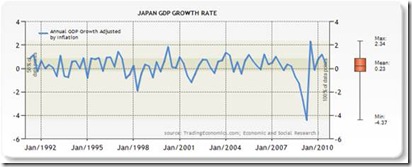Popular Economics Weekly
The Japanese twin disasters—an earthquake plus Tsunami—have highlighted both why Japan’s economy has basically sputtered since its real estate and stock bubbles burst in 1989-91, and why ours is taking so long to recover—we were not prepared for the shocks.
Japan, the country best prepared for natural disasters, wasn’t prepared for a disaster of this magnitude, just as Wall Street believed in a free market ideology that said banks knew enough to avert financial disaster in policing themselves without adequate regulatory oversight.
Just so, Japan wasn’t prepared for the bursting of its twin asset bubbles—in real estate and the stock market, when a single property in Tokyo briefly had a higher value than all of Manhattan. The result was real deflation, with prices falling for decades. And both Japan and U.S. wouldn’t put adequate resources to make up for the lost output, which is why our economy continues to sputter along.
In Japan’s case, it was because it chose to spend its monies trying to prop up failed institutions—rather than writing them off—because of the interlocking ownership of banks with corporations with real estate assets (called Keiretsu). So it couldn’t muster enough yen to stimulate more spending by its populace, who did what people instinctively do during recessions, they hoarded their assets in an attempt to keep them from losing value.
Deflation seems to be a puzzle that eludes even many economists. As Nobelist and former World Bank Chief Economist Joseph Stiglitz said recently in a Barron’s interview, “Money that isn’t spent lowers global aggregate demand”—i.e., can’t spur economic growth and so job creation.
And that is exactly what needed to be done. Dr. Stiglitz has called it Hoover economics, in memoriam of our President Herbert Hoover who tightened credit conditions at the beginning of the Great Depression, when he should have made credit easier.
“I am surprised that so many European leaders and some Americans, having seen the disaster of Hoover economics, are still going ahead with austerity,” he said, referring to the push by Germany and Great Britain to pay down their budget deficits. “The evidence is overwhelming that it will lead to an economic slowdown.”
The result for Japan has been an extended Great Recession, with falling prices and wages that has put it now in third place in GDP, according to the IMF, behind the U.S. and Chinese economies. We do know that deflation makes consumers more cautious. They tend to wait for prices to fall further (i.e., be discounted) before buying, whereas during inflationary times consumers react more quickly, thinking prices will be higher if they hesitate. And it is the money they spend, and not save, that circulates throughout an economy that increases aggregate demand.
Deflation, in a word, has been the great fear of Fed Chairman Ben Bernanke, a student of the Great Depression. And so he did not want a repeat of Hoover economics, which is why he has been pumping so much money into the U.S. economy via his various Quantitive Easing (QE) programs that have brought down interest rates on both Treasury Bonds and mortgages.
We have yet to learn the lessons of both the Japanese disasters and our own burst bubbles, according to Dr. Stiglitz. “Bernanke and Greenspan have to bear some responsibility for that ideology that bubbles don’t really exist, and they clearly do.” They weren’t prepared for the financial shocks, in other words. The lesson from Japan’s more recent disasters is that earthshaking events can happen, whether natural or manmade.
Harlan Green © 2011



No comments:
Post a Comment